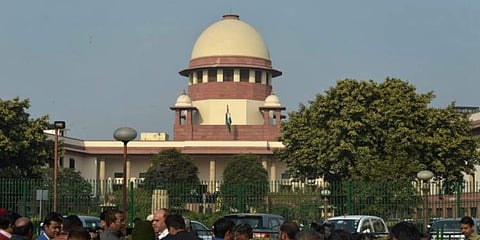

NEW DELHI: Emphasising that excess usage of Section 144 of the Code of Criminal Procedure (CrPC) would result in severe illegality, the Supreme Court on Friday said that it cannot be used as a tool to prevent expression of opinion, grievance or exercise of democratic rights. Section 144 of CrPC enables the State to take preventive measures to deal with imminent threats to public peace.
“This power should be used responsibly, only as a measure to preserve law and order. The order is open to judicial review, so that any person aggrieved by such an action can always approach the appropriate forum and challenge the same. But, the aforesaid means of judicial review will stand crippled if the order itself is unreasoned or unnotified,” the bench said while passing the judgment on the internet shutdown in Kashmir.
“The Constitution protects the expression of divergent views, legitimate expressions and disapproval, and this cannot be the basis for invocation of Section 144 unless there is sufficient material to show that there is likely to be an incitement to violence or threat to public safety,” the SC said.
Directing the authorities to immediately review the need for continuance of any existing orders passed under Section 144, the court said that power under this section is exercisable not only where there exists present danger, but also when there is an apprehension of danger. “However, the danger contemplated should be in the nature of an ‘emergency’ and for the purpose of preventing obstruction and annoyance or injury to any person lawfully employed. The power under Section 144, CrPC cannot be used to suppress legitimate expression of opinion or grievance or exercise of any democratic rights.”
The magistrate cannot apply a ‘straitjacket formula’ without assessing the gravity of the prevailing situation. The restrictions must be proportionate to the situation concerned, the bench said.
Excerpts
To consider the immediate impact of restrictions upon the realisation of the fundamental rights, the decision-maker must prioritise the various factors at stake. Such attribution of relative importance is what constitutes proportionality. It ought to be noted that a decision which curtails fundamental rights without appropriate justification will be classified as disproportionate.
Complete broad suspension of telecom services, be it the Internet or otherwise, being a drastic measure, must be considered by the State only if ‘necessary’ and ‘unavoidable’.
An emergency does not shield the actions of Government completely; disagreement does not justify destabilisation; the beacon of rule of law shines always.
In a situation where fundamental rights of the citizens are being curtailed, the same cannot be done through an arbitrary exercise of power; rather it should be based on objective facts.
The preventive/remedial measures under Section 144, CrPC should be based on the type of exigency, extent of territoriality, nature of restriction and the duration of the same.
A government, if it thinks that there is a threat to the law and order situation or any other such requirement, must follow the procedure laid down by law, taking into consideration the rights of the citizens, and pass appropriate need-based orders.
There is no doubt that the freedom of the press is a valuable and sacred right enshrined under Article 19(1)(a) of the Constitution. This right is required in any modern democracy without which there cannot be transfer of information or requisite discussion for a democratic society.
Expression through the internet has gained contemporary relevance and is one of the major means of information diffusion. Therefore, the freedom of speech and expression through the medium of internet is an integral part of Article 19(1)(a) and accordingly, any restriction on the same must be in accordance with Article 19(2) of the Constitution.
…Orders passed under Section 144, Cr.P.C. have direct consequences upon the fundamental rights of the public in general. Such a power, if used in a casual and cavalier manner, would result in severe illegality. This power should be used responsibly, only as a measure to preserve law and order. The order is open to judicial review, so that any person aggrieved by such an action can always approach the appropriate forum and challenge the same. But, the aforesaid means of judicial review will stand crippled if the order itself is unreasoned or un-notified.
Oppn says govt must remove restrictions
The opposition hailed the Supreme Court order and asked the government to immediately lift all restriction in the Valley and restore the democratic rights of people.
Congress leader Ghulam Nabi Azad said the Modi government had tried to mislead the people but the Supreme Court did not come under any pressure. “Modiji reminded that nation bows before Constitution and not him!” tweeted Congress leader Randeep Singh Surjewala.
CPM leader Sitaram Yechury tweeted: “The CPM demands that the central government remove all such restrictions, fully restore internet services, lift Section 144 and ensure the democratic rights of the people to freedom of speech and expression.”